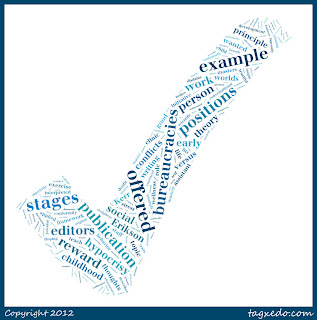Ars Gratia Artis (Art for Art's Sake)
 Now I know what my problem is: I’m a 3.0 in a 2.0 world!
Now I know what my problem is: I’m a 3.0 in a 2.0 world!
I’m discovering, through the assigned reading and mulling over my work experience, why I have an aversion to monetary “incentives.” And Daniel Pink (Drive) put my thoughts into words: they don’t work (at least, not for me, and, evidently, lots of us). The monetary reward is value-based – not my value, but someone else’s (Who? A manager, someone in HR, a senior leader?). It suggests I as an employee, only do dreary, mundane, and boring work for the money, and more money will make me produce, well, more better. But money is not my highest value. Given: being well-compensated is desirable, but higher on my list of values are my time, autonomy, mastering challenges, and quality of life. As Pink writes, “Enjoyment-based intrinsic motivation, namely how creative a person feels when working on the project, is the strongest and most pervasive driver” (p. 21). Or, more popularly, as the MGM logo proclaims, "Art for art's sake."
News flash: you can’t “motivate” or “incentivize” people by traditional rewards. Managers spend hours contemplating how to motivate people, as if a mere extrinsic factor will motivate a person into high performance or job satisfaction. Consider the matter of “disciplining” a child. Parents or caretakers who shout, dominate, or use corporal means to get children to conform to their expectations are – guess what? – not disciplining a child; they are punishing a child. They are inflicting from outside of the child, instilling fear, not discipline (extrinsic motivation, or 2.0). Authentic discipline comes f rom within the child; a parent can offer gentle and firm influence because – guess what? – it’s only integrated discipline when the motivation comes from within (intrinsic motivation, or 3.0).
rom within the child; a parent can offer gentle and firm influence because – guess what? – it’s only integrated discipline when the motivation comes from within (intrinsic motivation, or 3.0).
I have direct experience with the way Motivation 2.0 undermines the pleasure of Motivation 3.0. I am, you see, an artist. I use paints, paper, sewing, fabrics, wood and found objects in projects, varying widely in technique and materials. At times I’ve had encouragement to pursue one line or another as the source of earning a living. At first I was jazzed, thinking, “What satisfaction, to have all of that time to create.” Followed by, “For money?” – phizzle ! poof! – no way. To alter a process I savor – really, it’s the making of the thing, not the end point – into a money-making enterprise zapped my enthusiasm for the endeavor. I would rather be employed and use creativity every chance I could get at work. I am, afterall, a heuristic (non-algorithmic) laborer.
The term “mastery” crept into this week’s reading, Daniel Pink’s Drive, as it did the previous assignment (my previous blog installment referred to Erikson’s theory of eight stages of life development, each of which has its own “crisis” - I prefer "challenge" - the resolving of which is accomplished through mastery of that stage). The word caught my attention when used to describe the reason people contribute to open-source projects, as “The fun of mastering the challenge of a given software problem.” Additional uses of “mastery” are in the context of pleasure and enjoyment in one’s work.

And, so, I would be remiss if I overlooked directing you to a remarkable source. Former United States Army Air Corps pilot, George Leonard, once an editor of Look Magazine, and past-president of the Association for Humanistic Psychology, wrote Mastery: The Keys to Success and Long Term Fulfillment (1991). Other books he authored include Education and Ecstasy, The Ultimate Athlete and In Search of the Warrior Spirit: Teaching Awareness Disciplines to the Green Berets. Leonard was a journalist on the forefront of observing the ‘60s’ counter culture movement in California; he helped define the human potential movement. He studied the Japanese martial art, aikido, for upwards of five decades, and was a fifth-degree black belt well before his death two years ago (86 years young). I learned of Leonard through my own decade of training in aikido.

See the beauty of aikido in this video: http://www.integralaikido.org/gallery_sandan_caro.html
Labels: aikido, Ars gratia artis, arts, creative, Daniel Pink, Drive, extrinsic motivation, George Leonard, incentive, intrinsic motivation, Mastery, motivation 2.0, motivation 3.0, project, reward




